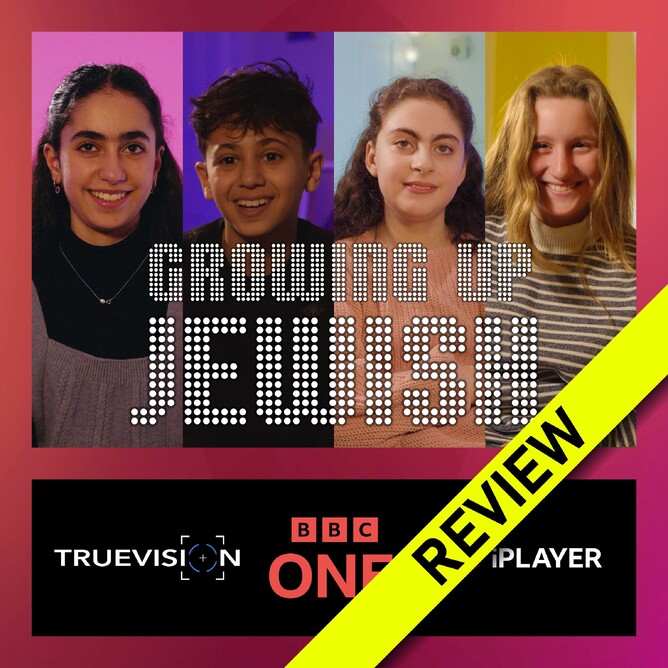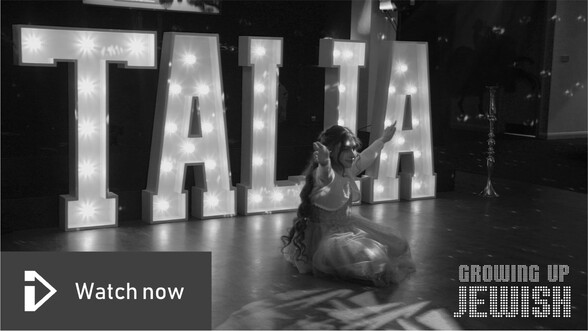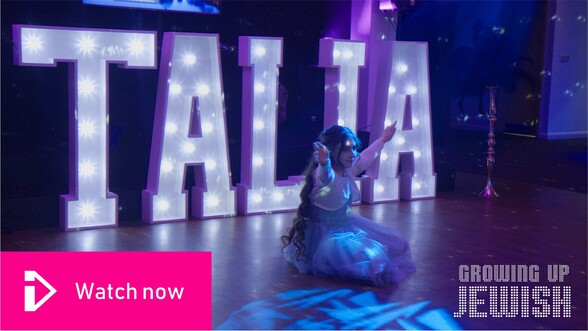Have you watched the BBC One b'mitzvah documentary, yet? If not, you're probably the only one (other than the naysayers who pre-judge any TV shows on the BBC or about Jewish life).
Full disclosure
Before I share my own reflections, you ought to know that I had some involvment in the show.
In the closing hours of 2023, I got a message from one of my b'mitzvah families asking if it would be okay to give my number to a TV producer who wanted to film their child's simcha for BBC One.
The producer turned out to be award-winning documentary filmmaker, Rosemary Baker, best known by some of you (or your kids!) for Channel 4's Untold: The Truth About Spiking, Gogglebox: How to Make It on OnlyFans, and The Times Critics' Choice Unreal! With TikTok and YouTube star Olivia Neill on BBC. She is now producer director for the renowned and prolific True Vision Productions, and you're bound to've seen any number of 100s of programmes they've made for the likes of the BBC, ITV, Channel 4, and Sky.
I went in to the first of several in-depth conversations with Rose and her team feeling somewhat cautious. I barely watch the telly. But I do share the impression common amongst many Jews that BBC programming can be somewhat biased, especially against Israel and Zionism. (According to polling by Campaign Against Antisemtism, only 6% of British Jews do not consider themselves to be Zionist.)
I'm also very protective of my clients. Anyone who's hired me to DJ/MC and party plan their functions know how heavily I invest in my relationships with families who've entrusted their milestone events to me. They tell me that by the time of their gigs it often feels like we're family.
That, and the unprecedented rise in antisemitism since the 7 October 2003 attrocities, made me determined to find out exactly what these filmmakers wanted to show.
It's legit
The first thing to say about the documentary is that it is an authentic observation of the build up to and celebration of the Jewish coming of age milestone: the b'mitzvah.
I've been helping families mark these occassions for over 30 years, not long after I'd celebrated my own with a raucous house party in a shaky marquee in the back garden with a loveable but slightly sketchy Israeli 3-piece rock band. That was enough to give me a life-long party bug.
Since then I've seen it all when it comes to simchas—every level of religosity from completely secular to ultra-orthodox, and the full spectra of cultural backgrounds, countries of origin, gender, neurodivergency, and states of personal finances.
What we saw in "Growing Up Jewish" was a pretty good representation of the NW London Jewish scene from the perspectives of 4 families.
There're always going to be questions about who the programme makers chose to showcase. Maybe they could've included what many would think of as a "traditional bar mitzvah" with a boy learning his Torah parasha (passage) to recite in a synagogue on the Sabbath. Maybe they could've included a family facing financial hardship trying to throw together the kind of no-frills barn dance their ancestors would've experienced, akin to the wedding scene in Fiddler On The Roof. (Must re-watch!)
But all in all, these were the sort of real families we all know with their vaious quirks, wanting to do the best for their children at this juncture between childhood and... well... as Talia, one of the kids (and the one who's family I was with) puts it... "not quite an adult, but...".
Of course, you can't show a lot in 50 minutes. B'mitzvahs can be months or years in the making, and involve days or weeks of effort even with the support of a party planner. But what the BBC did show certainly left us with the essence of what they're like.
And if you've already thrown a b'mitzvah there'll be a lot you'll recognise with a sentimental affection.
It won't please everyone
Immediately after its screening—which was an hour after yom tov on the second day of Passover—there was criticism for its timing so late at night. Despite it's timing, TV critic Lucy Mangan was hyper-keen to post her review in The Guardian at 11:30PM, exactly 50 minutes after the start of the 49 minute show, sniping "wildly inappropriately lightweight for the times". She seemed to need the children, their families, or the programme itself to comment more deeply on what's happening to Palestinians in Gaza, dismissing the show as "a prophylactic against the rising antisemitism".
Inevetibly there'll be negative comments on some of the Jewish groups on Facebook, no doubt lamenting supposed discrepancies with what should be done to mark a b'mitzvah, what the families shouldn't have done, and missing the colourful reality of pluralism in Jewish culture.
Come on, fam! Jews alive today only survive because our ancestors managed to escape at least one genocidal threat over the last 3½ thousand years. Let's celebrate making it this far. L'chaim! (That's the Jewish toast "to life!")
One recurring quesion put to me in my inbox has been about the time it was broadcast, at 10:40PM, being late at night despite being intended for family viewing. One reason could be that the BBC rightly made the effort to avoid it coinciding with one of the 4 holy days of the 8-day Jewish festival of Passover which would've precluded the third or so of Jews who are observant enough to not switch on the TV on those days.
At least it's available to watch on catch up!
What we learned
The beauty of this documentary is that we—British Jews—won't have learned much. For me, at least, it felt reassuring and loveably sentimental. It gave a fresh vantage point to a familiar life event, not as a celebrant, not as a guest, and in my case not as a DJ/MC and party planner, but as an affectionate yet invisible onlooker.
And I didn't feel surprised that I immediately warmed to each family and their kids the moment we were introduced in the opening scenes. They are, after all, my people. And as their journeys unfold, we become more attached and invested in what we know (or hope) wil be the triumphant outcome of fulfillment and affirmation. We know that even if they mess up their d'var Torah, laining (reading from the scrolls), or speech, no one will love them any less. In fact, however they perform, they'll be a focal point for goodness.
For me, a large part of that affirmation is watching the kids develop and grow, and their families with them. It's not just about learning bit of Jewish practice and knowledge. It's watching them learning how to be the centre of attention with grace, how to exercise "the golden rule" and to give to others, and how to become mindful about the person they want to become.
It's also—for the b'mitzvah kids their friends—a perfect opportunity to learn how to party, and celebrate the miracle of life, attaining a milestone after 12 or 13 years of ups and downs.
The parties wouldn't be as joyous if there wasn't a struggle to get there. I always ask b'mitzvah kids, as I'm sure I'd have asked Talia (if she hadn't eagerly pre-empted the question) "So, what's your contribution to all this razzmatazz?"
I'm interested in their special project, their charity fundraiser, their volunteering, their exposure to new experiences. And it was again reassuring to know that it's normal for b'mitzvah kids to undertake these challenges in the build up to their big weekends.
There's also the spiritual side, captured movingly by the filmmakers with a far slower paced sinking of the sun beyond the horizon and quietening atmosphere as each family closes their curtains on the outside world and heralds in the Sabbath in their own ways. That brought back memories for me of my own family's Jewish celebrations, more intimate times with immediate family before facing everyone else en masse the following day.
And I loved the details of their different ceremonies brought to life by, for example, the subtitles in Hebrew fading to English with—thank you thank you thank you—accurate translations. There were also accurate explanations of terminology like "mitzvah" meaning "command" or "good deed", evocative of a multi-millennia spanning special connection to a people, a higher being, or family, or any combination of the above.
Being open
What will also be gratifying for many Jewish viewers is the openness of the families and how Rose and her team were able to connect with them well enough to coax out their natural and unhindered emotions and sentiments during the build up and aftermath.
I've never met a b'mitzvah family who hasn't relished in inviting guests who aren't Jewish. We love brining them in to our circle during the "hora" Israeli dancing set. We love printing out explainer flyers to hand out in shul so they know what's going on. We love hearing them exclaim "mazal tov!"
To some, we might seem secretive and insular at times. But it's only security concerns that hamper a typically open-door policy. We caught a glimpse of the security fences and guards outside Jewish buildings. There'll have been both professional and community volunteer security patrols outside all of these ceremonies as there is at many Jewish parties.
It was wonderful to see Eve's mixed religion family, watching grandmother asking granddaughter about her feelings of Jewishness. Eve's comfort in sharing her thoughts to accepting, caring ears. (Now that's the way to talk about our different belief systems, isn't it!)
And all the kids expressing themselves openly, too. Dylan's sensitivity to the suffering of others, even of those who sought his people's destruction. His teacher coaching him on how to put those concerns in to his speech. And his parents' moving reations on hearing him read it out in front of so many family and friends.
Ayala sharing the dichotomy she felt between being the Rabbi's daughter as well as having her own preferences, all acknowledged and appreciated by her parents.
Even better, all of these intimate moments shared on national TV for everyone to see.
Unless you just don't like Jews, what's not to like?
Team work makes the dream work
Most people never get to see the effort involved in throwing a b'mitzvah party and ceremony, let alone the journey getting there unless they've lived it.
This is not "all about the kid". Sure, it's because of the kid. But it's actually about everyone who's been a part of getting the kid to that point in life (hopefully) in one piece—parents, siblings, extended family, friends, community—and the myriad service providers.
I think they captured me explaining this in the programme.
The other DJ featured, Elliot Spencer, puts his heart and soul in to these events, too. I've partied at gigs he's DJ'd many times and he's consistently brilliant! We're just 2 of a dozen or so simcha DJs and event planners serving Jewish communities in London and beyond. Besides us, there are countless caterers, venue managers, production companies, bands, furniture suppliers, entertainers, creative designers, florists, decorators, photographers, and videographers (shout out to the excellent Sammi Patnick who videoed Talia's party for the family).
Of course, there're the all-important teachers, rabbis, coaches, synagogue managers, lay volunteers, and mentors looking after the childrens' spiritual development.
And for this 50-minute TV programme, days of filming and editing by a crew immersed in their art, gear, storytelling, and grind. I was constantly taken aback by their attentiveness to Talia and her family so they could capture and display the ruach—Hebrew word for "spirit"—of her simcha.
If you need further evidence of the credibility of Rose and her team it's this: Shortly before Talia's gig, Rose asked me what she should wear on the big night. I guess the standard uniform for a film crew at an event would be fade-into-the-background all black. But I advised that to truly take part, it'd be appropriate to wear a glitzy party frock matched with comfortable trainers. And that's exactly how she showed up!
I don't know if it was part of a pro getting in to the vibe or whether she just couldn't help herself (or maybe I'm just a very persuassive DJ!) but she joinedin on the dancefloor with the rest of the guests. And I wonder... was that was a tear in her eye when we reached one emotional climax during the evening?
Was it worth watching?
Yes, very much so. As I said at the start, I barely watch telly. But I'd have been glad I watched this even if I wasn't in it and even if one of my b'mitzvah families wasn't featured. You can't help but feel uplifted watching people who love each other invest in a rite of passage together.
I don't know if it was the skills of True Vision (as I have no competence in anything to do with lenses), or if it was the relationship Rose built with me (as she did with Talia and her family and ther others I'm sure, too), but the producers' commitment to authenticity seemed to deliver a programme about what for me always feels like a magical period of time, one I'm privileged to experience alongside dozens of families every year.
Meanwhile, my DMs and notifications continue to light up as more and more people want to talk about the show!
I congratulate and thank everyone involved with "Growing Up Jewish" for an uplifting, loveable, affirming, and authentic ob-doc!



